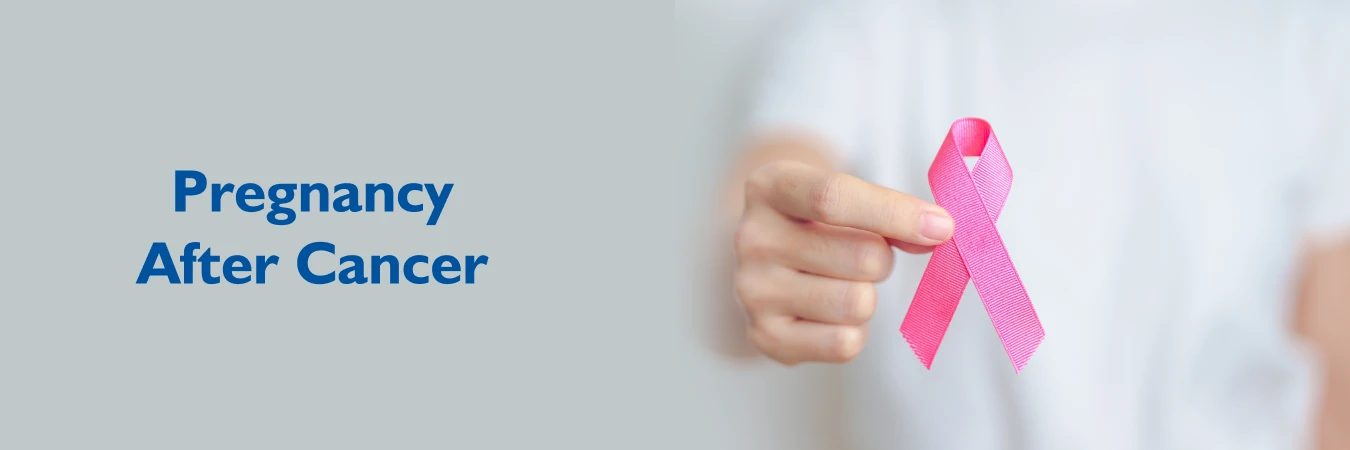- Cardiology 84
- Dermatology 45
- Endocrinology 33
- ENT 16
- Fertility 190
- Gastroenterology 78
- General-Medicine 81
- Gynecology 80
- Hematology 19
- Infectious-Diseases 33
- Neurology 52
- Oncology 34
- Ophthalmology 23
- Orthopedics 69
- Pediatrics 31
- Procedure 23
- Public-Health 144
- Pulmonology 59
- Radiology 8
- Urology 68
- Wellness 161
- Woman-and-child 77

Pregnancy After Cancer: Can You Get Pregnant After Cancer?
Cancer is no longer a rare disease that affects only others; today, it affects homes everywhere. Cancer spares no one, and the unpredictable growth of abnormal cells can occur in anyone's body.
Cancer treatments, particularly chemotherapy, cause significant side effects, impacting every part of the body, including fertility. Even after treatment ends, the residual effects can continue to harm the body, particularly the reproductive organs.
Effects Of Cancer Treatments On Pregnancy
Treatments such as radiation therapy, chemotherapy, or cervical surgery can significantly affect future pregnancies:
- Radiation therapy affects the blood supply and support cells of the uterus, increasing the risks of miscarriage, premature birth, or low birth weight.
- Chemotherapy increases the risk of heart disease in women, making pregnancy challenging.
- Cervical surgery can affect the cervix, increasing the likelihood of miscarriage or premature birth.
Secure your health with a second opinion. Make informed decisions and book your appointment today!
Get A Second OpinionPregnancy After Cancer Treatments
- Pregnancy after recovering from cancer can be daunting, especially for those considering cancer after pregnancy. Many patients fear that their unborn child could be affected by the illness in the uterus, causing anxiety and nightmares.
- Doctors advise waiting at least 2 years before planning a baby to minimize the impact of strong cancer treatment drugs on the baby. Concerns primarily revolve around potential deformities and abnormalities in the fetus.
- For young patients without children or planning delayed parenthood, doctors recommend fertility preservation before chemotherapy. Chemotherapy and radiation can damage eggs in the ovaries, risking permanent damage and birth defects if used after treatment.
- Egg freezing offers a viable option, preserving fertility for up to 10 years and safeguarding against the effects of radiation or chemotherapy. Similarly, men near testicular radiation should consider sperm freezing for future use, ensuring reproductive options without delay.
Ready to take control of your health journey? Book your appointment now and start your path towards wellness today!
Book an AppointmentSuggestions For Patients Undergoing Treatment
Couples navigating cancer treatment while desiring children can opt for surrogacy if the uterus is damaged or removed.
Uterine cancer, common in women, often necessitates removal, with surrogacy offering a viable alternative. Today, surrogacy is commonplace, arranged through fertility clinics with no genetic link or legal claim to the baby, reassuring parents.
Despite cancer's challenges, fertility options exist, ensuring hope for high-risk pregnancy after cancer and cancer after pregnancy.
Other Concerns About Pregnancy After Cancer
Concerns about cancer recurrence and the hereditary risk of cancer in offspring prompt some healthcare providers to advise a 2-year wait before attempting pregnancy. Cancer treatments can affect fertility, making conception and carrying a pregnancy to term challenging.
It's advisable for both men and women considering parenthood to discuss potential infertility with their healthcare provider before treatment begins, exploring fertility preservation options.
Frequently Asked Questions
Usually, pregnancy after cancer treatment is safe for both the mother and baby. It does not seem to raise the risk of cancer coming back. Still, some women may be told to wait a number of years before trying to have a baby.
A pregnant woman with cancer has the same outlook as a woman with cancer who isn't pregnant. Typically, being pregnant while having cancer shouldn't affect your overall prognosis.
Chemotherapy can stop your ovaries from functioning. This causes infertility, which can be temporary or permanent. It can also lead to early menopause.
Chemotherapy can damage sperm forming cells in young boys and sperm in many men. Moreover, hormone therapy can also decrease the production of sperm.
Chemotherapy seems to be safe for the baby if given in the second or third trimester of pregnancy, but it isn't safe in the first trimester. Other breast cancer treatments, such as hormone therapy, targeted therapy, and radiation therapy, are more likely to harm the baby and are not usually given during pregnancy.

- Cardiology 2132
- Dermatology 168
- Endocrinology 135
- ENT 97
- Fertility 217
- Gastroenterology 232
- General 478
- General-Medicine 1685
- Gynecology 169
- Hematology 85
- Infectious-Diseases 208
- Neurology 207
- Oncology 345
- Ophthalmology 65
- Orthopedics 187
- Pediatrics 83
- Procedure 72
- Public-Health 209
- Pulmonology 126
- Radiology 13
- Second Opinion 311
- Urology 294
- Wellness 600
- Woman-and-child 447
Related Blogs
If you have any questions, please fill out the enquiry form or call us, and we will get back to you promptly.
040-68334455